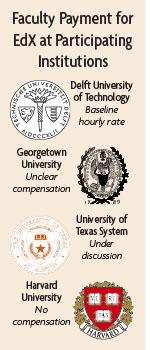
News
Cambridge Residents Slam Council Proposal to Delay Bike Lane Construction

News
‘Gender-Affirming Slay Fest’: Harvard College QSA Hosts Annual Queer Prom

News
‘Not Being Nerds’: Harvard Students Dance to Tinashe at Yardfest

News
Wrongful Death Trial Against CAMHS Employee Over 2015 Student Suicide To Begin Tuesday

News
Cornel West, Harvard Affiliates Call for University to Divest from ‘Israeli Apartheid’ at Rally
EdX Considers Compensation Models

Gregory Nagy, a classical Greek literature professor who created CB22x: The Ancient Greek Hero for HarvardX, approximated that he spends about 25 hours a week working on his course above and beyond his other responsibilities—making his total professional workload more than 1.5 times as big as it would be otherwise.
Under the extant compensation model of HarvardX—Harvard’s subset of edX, a nonprofit virtual learning initiative launched by Harvard and MIT last May—Nagy is paid nothing for those hours.
“I get zero compensation, having asked for zero,” said Nagy.
As universities are increasingly looking to incorporate MOOCs—massive open online courses—and platforms like edX into their pedagogical infrastructure, educational leaders have begun to discuss how to compensate faculty who transfer their traditionally taught courses to the online platform. Although edX does not have a universal compensation policy, each of its partner institutions can decide how it will give back to instructors.
According to edX President Anant Agarwal, proposed compensation models include sharing earned income between participating professors, using research grants to support faculty, and maintaining a voluntary structure. For most of the schools in the “X University” Consortium, including Wellesley, McGill, and the University of Texas system, payment for professors is still under discussion.
And even those professors who are paid by their respective institutions will probably receive just a token payment considering the time commitment.
“The compensation is based on an internal hourly rate, which is not very high,” said Willem van Valkenburg, DelftX project director, in an emailed statement. Both DelftX and GeorgetownX plan to compensate their faculty members for their efforts.
Nagy, a self-proclaimed “workaholic,” said the absence of significant monetary dividends is not necessarily a hindrance. He calls teaching a “labor of love” that is compensation in itself. All professors interviewed for this article voiced a moral, rather than pecuniary, motivation for participating in edX.
“It is definitely a lot of work to not get paid for, but we wouldn’t be doing it if we didn’t think it was worth it,” said Dan Klein, who teaches BerkeleyX’s CS188.1x: Artificial Intelligence.
“The compensation is the feeling that you’re reaching a lot of students and that you’re improving your local class as you do it,” he added. “Like so many things in academia, there are many things that are important that are not directly reflected in the official duties of the professor or the compensation structure.”
Klein’s co-instructor Pieter Abbeel echoed this sentiment.
“The biggest thing to me is providing access to high-quality classes from some of the best schools in the world to students who wouldn’t have access,” he said.
—Staff writer Amna H. Hashmi can be reached at amnahashmi@college.harvard.edu. Follow her on Twitter @amna_hashmi.
—Staff writer Cynthia W. Shih can be reached at cshih@college.harvard.edu. Follow her on Twitter at @CShih7.
Want to keep up with breaking news? Subscribe to our email newsletter.
